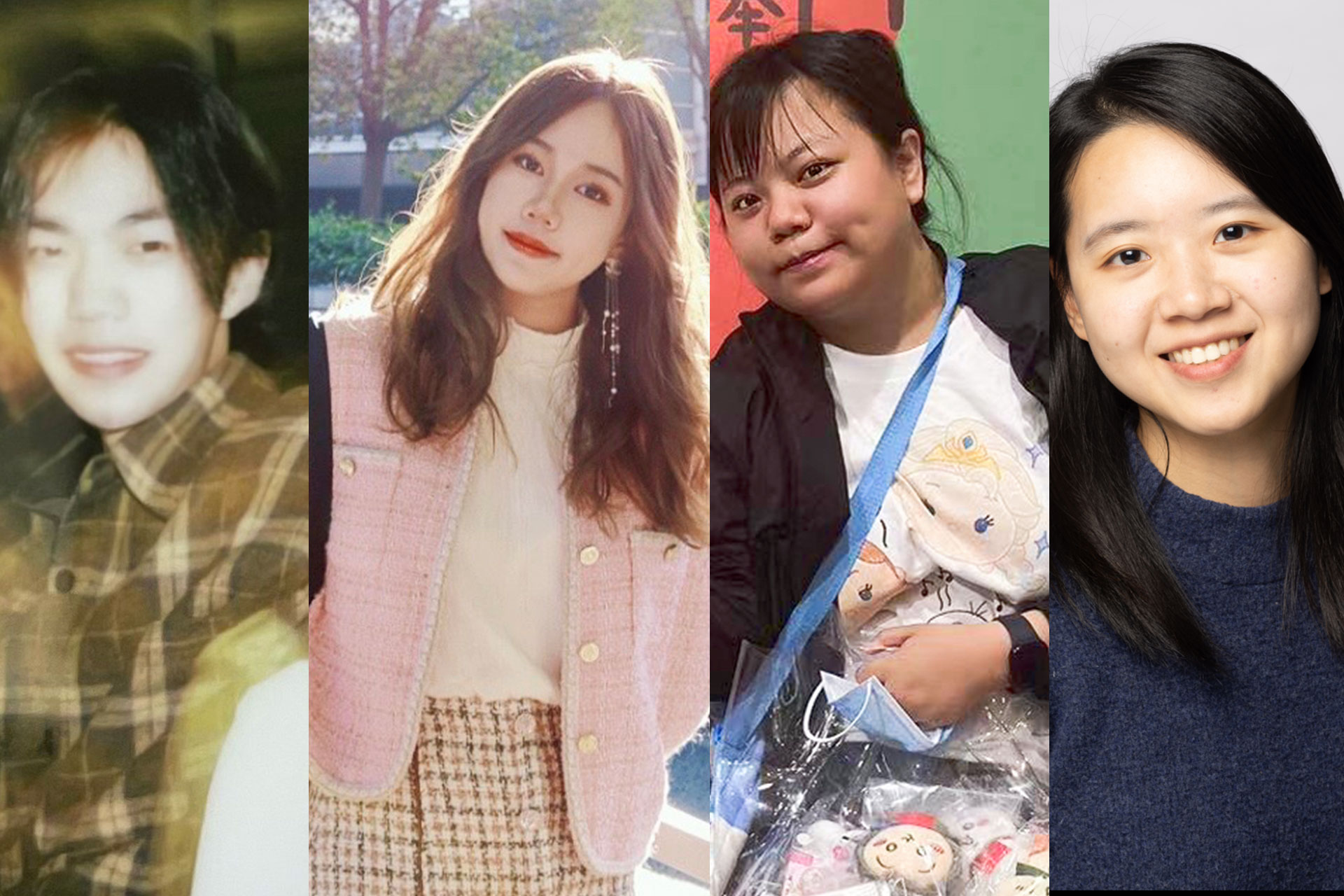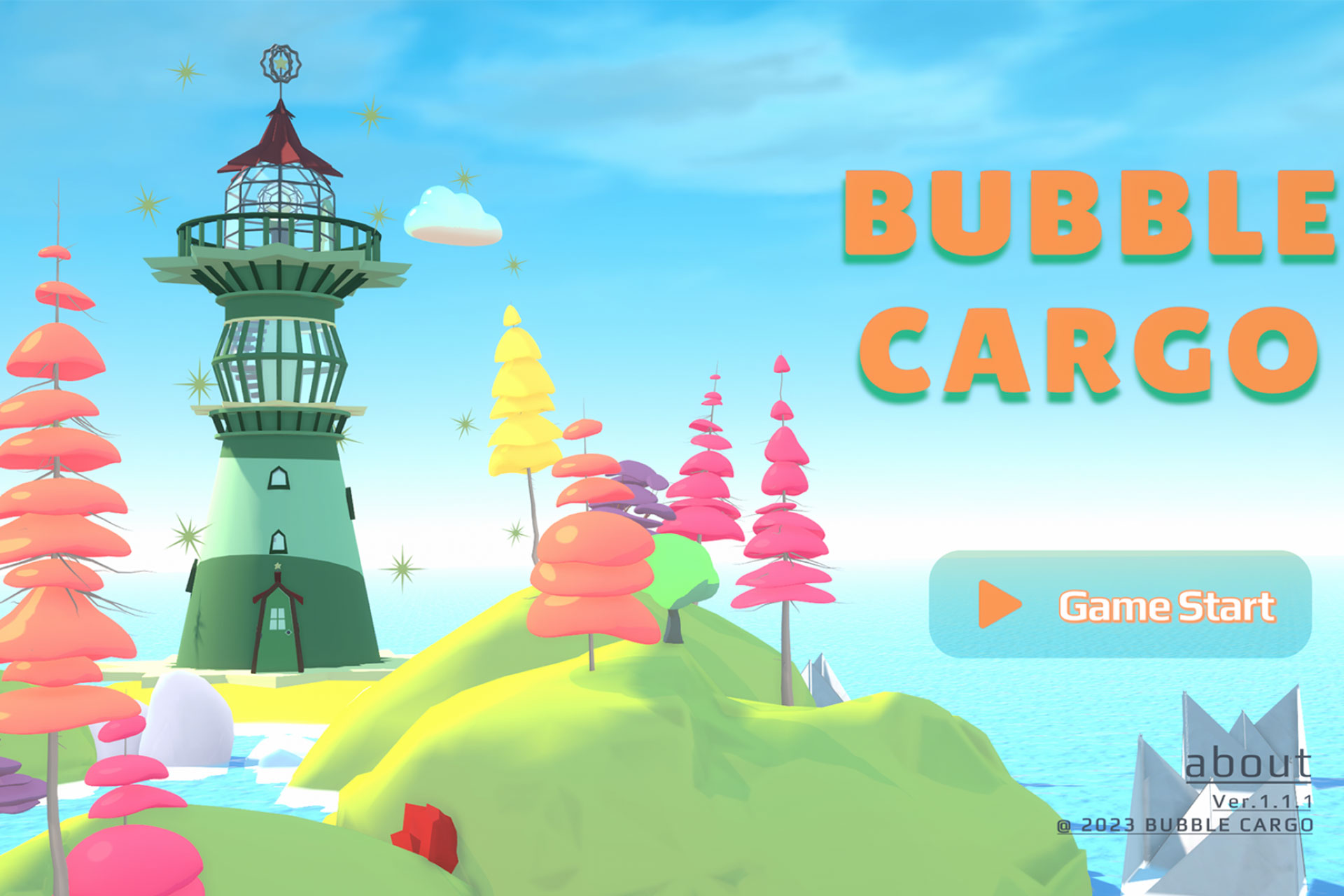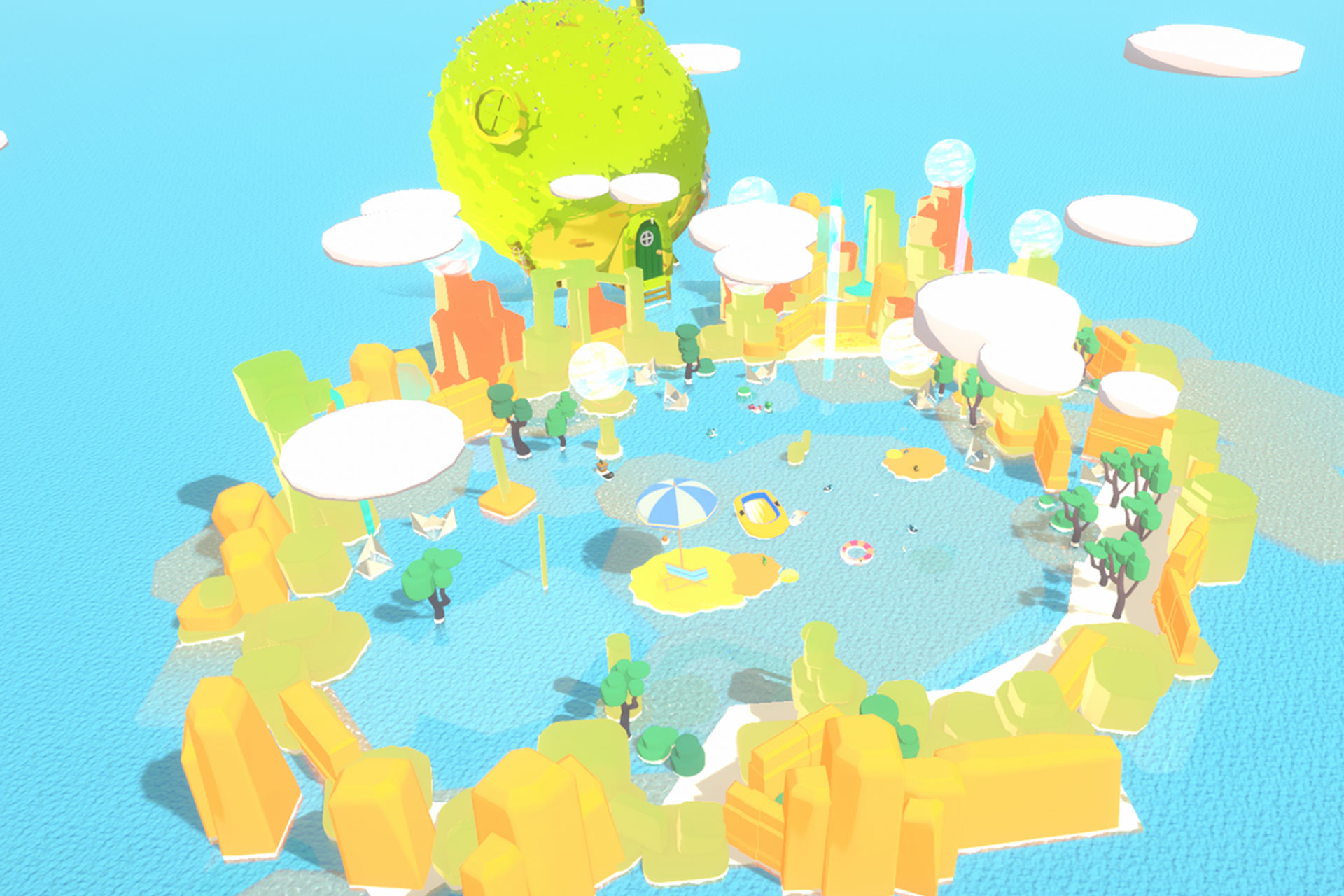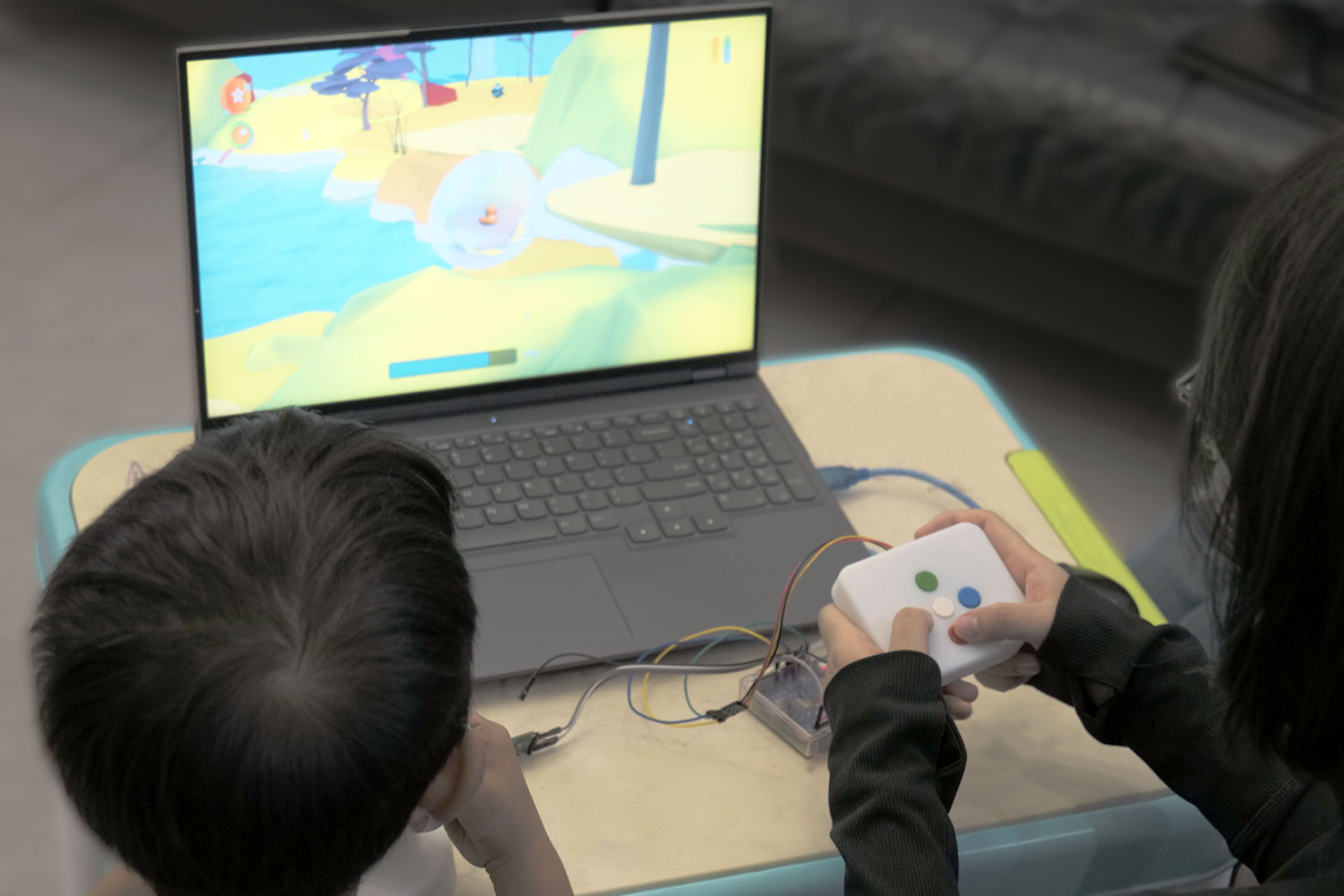MAKITR1O STUDIO on Designing Playful Healing with Bubble Cargo

A Talk with Zhong Zicheng on How His sNug Sock Design Solved Real-World Challenges
January 14, 2025
A Sit Down with Jason Wilkinson: Innovating Everyday Solutions with 30+ Years of Expertise
January 14, 2025MAKITR1IO STUDIO
MAKITR1O STUDIO unites Xu Liyi, Yijuan Li, Chenwei Ye, and Shurong Han in a shared passion for human-centered design. Combining expertise in design, multimedia research, game development, and psychology, they address complex social challenges with creativity. Focused on games that enhance emotional well-being and cognitive growth, they blend innovation with meaningful engagement. Their mission is to craft playful, impactful solutions through technology.
Liyi: My name is Xu Liyi, and I am interested in human-centered design. I have a background in design and human-computer interaction.
Yijuan: I'm a design researcher with multimedia skills and I love addressing complex social issues with participatory research and playful solutions.
Chenwei: I'm a game designer focused on creating games that enhance emotional well-being and cognitive development. My background includes game design, user experience, and psychology.
Shurong: I'm a game designer and technician who is always learning. I want to use technology to create something fun and useful!
Liyi: As a child, I enjoyed painting, and during college, I developed an admiration for the renowned designer Kenya Hara. Design is a discipline filled with creativity and endless possibilities. Through design, I can solve practical problems in life using various approaches, which not only makes people's lives happier but also brings me great satisfaction.
Yijuan: The passion for solving problems and curiosity about diverse knowledge are key motivators. A designer is someone who magically combines different skills to work out a solution.
Chenwei: I became a game designer because I’m fascinated by the impact games can have; they’re powerful tools for interaction and expression.
Shurong: When I was working on a Minesweeper assignment in my first year of university, I realized I loved creating things that interact with people. Design is a way to solve problems and requires interaction, which greatly appeals to me. That's why I became a game designer and developer.
Liyi: I have completed several internships at major companies and founded MAK1TREAL STUDIO in 2023. The four authors of BUBBLE CARGO are also founding members. We are passionate about providing solutions to those in need through engaging designs.
Yijuan:I am a designer specializing in sound at our studio. I emphasize the power of multisensory experiences and joy to influence people.
Liyi: I believe that 'design' is an art form that allows me to express my personal values, but it differs from pure art in that it is grounded in real life and exists within it.
Yijuan: It means combining existing technologies to build a new solution that can make the world better.
Chenwei: Design means transforming ideas into visual and interactive forms, creating emotional connections, and facilitating communication.
Shurong: Design is a powerful way to transform life and impact the world, offering innovative solutions that enhance our experiences and interactions.
Liyi: I like designs that are minimalist yet practical, such as those by MUJI. These designs make people feel comfortable and reconnect with the essence of life.
Liyi: My designs are lively, as simple and practical as possible, and aim to help users meet their needs in the quickest and most enjoyable way.
Yijuan: Good design is intuitive. It can solve complex problems with minimal technique and cost. It enables users to understand how to use it without specific instructions. It provides inclusive solutions that benefit everyone.
Chenwei: A good design resonates with users, evoking emotions and guiding them into immersive experiences.
Shurong: To me, a good design is intuitive and resonates with people.
Liyi: First, I deeply analyze the problem by researching user needs and the current market to establish a clear design direction. Then, I engage in extensive brainstorming and sketching, refining ideas through iteration. Finally, I combine prototype testing with user feedback to continuously adjust the design to meet users' final needs.
Chenwei: My design style emphasizes creating interactive and engaging experiences that prioritize user enjoyment and emotional connection. I strive for simplicity and clarity while incorporating elements of surprise and discovery.
Shurong: I focus on feasibility and aim to solve problems as concisely as possible.
Yijuan: I like to conduct my primary research in the form of game workshops. I want my research participants to enjoy the process and experience the charm of co-creation.
Chenwei: My design process starts with concept development and prototyping, followed by iterative refinement based on user feedback.
Shurong: First, I conduct research, such as user interviews, followed by brainstorming, creating prototypes, and selecting the best options for further iteration.
Liyi: Yes, my country and cultural heritage profoundly impact my design process. They enrich my choices of colors, shapes, and materials and make me focus more on storytelling and emotional connections in my designs. This cultural influence helps me create designs that are globally appealing yet distinctly local.
Yijuan: Yes, in my country, people admire hard work. This motivates me to encourage others to find joy even during work. I aim to make difficult tasks easier and more enjoyable for people.
Chenwei: Certainly. My country's cultural heritage influences my design process, shaping my approach and inspiring various elements of my work.
Shurong: Yes, for example, when we design a scene, we often draw inspiration from Zen.
Liyi: Winning the 2024 MUSE Design Awards is of great significance to me and my team. It is not only a recognition of our innovative capabilities and hard work but also greatly enhances our brand image and market position. This award motivates us to continue striving for excellence and to drive innovation and progress in the design industry.
Yijuan: As an early-stage designer, proving the business value of design is crucial for employability. However, many valuable projects require a lot of effort without fair compensation. Winning this award can help establish the value of our design and make it easier to survive in the tough market, which already means a lot to our potential users.
Chenwei: Winning the 2024 MUSE Design Awards validates our team's efforts and design philosophy, opening doors for future projects.
Shurong: This award means that our project and design concept have been recognized, which will encourage us to continue developing.
Liyi: I recruited participants online for an extended period to gather enough individuals.
Yijuan: We are an international team with members based in different locations and time zones. Remote work makes collaboration challenging.
Chenwei: Coordinating an international team across different time zones was a major challenge, but effective communication helped us overcome it.
Shurong: We are located in different regions and rely on online cooperation, so there is often a time lag in communication.
Liyi: Winning this award has greatly advanced my career and practice. It has brought more industry recognition and visibility to me and my team, opened up collaborations with global brands and designers, and attracted new clients and projects.
This recognition not only strengthens our market competitiveness but also deepens our understanding of and pursuit of the impact of design.
Liyi: My top 3 favorite things about the industry are the following:
Innovation - The design industry continually drives progress, using new technologies and ideas to solve complex problems, making the work both challenging and exciting.
Diversity - The industry brings together talent from various cultural backgrounds and professional skills, fostering creativity and diverse solutions.
Impact - Design is not just about appearance and functionality; it deeply influences people's lifestyles and behaviors, with the potential to change the world.
Yijuan: Full of ambitious world-changers, collaboration with diverse industries—it's beautiful.
Chenwei: Three of my favorite things about our industry are the passion for positive change, collaboration across diverse industries, and the inherent beauty in creative expression.
Shurong: Collaborating with people from different backgrounds, exploring various themes, and creating life-changing objects.
Liyi: My country's unique position in the design industry stems from the combination of its rich cultural heritage and modern innovation. This fusion allows our designs to embody both traditional artistic aesthetics and modern technological and intellectual innovations.
For example, we can see this unique combination in ceramics, textiles, and architectural design. Additionally, the emphasis on and protection of craftsmanship help our design industry maintain its uniqueness and competitiveness in the global market.
Yijuan: It is highly influenced by diverse cultures and people.
Chenwei: What makes my country unique in the design industry is its rich cultural heritage, which fosters creativity and innovation by blending diverse cultural influences.
Shurong: A long history of culture and people from different backgrounds.
Liyi: In the next 5 to 10 years, the design industry is likely to focus on the following areas:
Sustainability and eco-friendly design - As global environmental awareness increases, the design industry will focus more on sustainability, including the use of environmentally friendly materials and renewable resources, as well as designing recyclable products.
Digitalization and technology integration - Technology, especially artificial intelligence, virtual reality, and augmented reality, will be more deeply integrated into the design process, making designs more precise and personalized.
Emphasis on user experience - The focus of design will increasingly lean toward user experience, applying design thinking to solve broader social and economic issues and enhancing user interaction and experience.
Yijuan: There is a big challenge in developing human-centered solutions.
Shurong: Communicate with different people, gather suggestions, and continuously improve the design.
Liyi: Here are some resources that I find would be helpful!
Online courses - Platforms like Coursera and Skillshare offer a wide range of design-related courses.
Books - "The Design of Everyday Things" by Don Norman deeply explores design principles.
Community Engagement - Join Dribbble or Behance to network with other designers and receive feedback.
Yijuan: There are tons of books already available for people to read. I would say the information in books is designed for readers to digest bit by bit and is full of references.
Even though I am a fan of online courses like Coursera and MOOC, short posts on social media might give the misleading impression that you are learning something through them. I highly recommend people read systematic knowledge from books instead of spending 10 minutes on a fast-food post.
Chenwei: To improve skills in the design industry, I recommend reading books for systematic knowledge and taking online courses for structured learning. Books provide in-depth understanding and references, while online courses offer practical skills and techniques.
Shurong: Just find a project that interests you and start working on it, and you will improve in various aspects during the process. Reading related books, such as "Design Thinking," is also a good choice.
Liyi: In the world of design, I sometimes weave personal secrets or stories into my work, making each design not only reflect the client's needs but also leave a personal emotional imprint. However, I usually do not share these details publicly, which makes each project uniquely personal to me.
Liyi: In my life and career, my greatest inspiration has been my mentor. She is not only an outstanding designer but also taught me how to apply creative thinking to solve practical problems.
Her passion for design and strict attention to detail have shown me that becoming an excellent designer is not just about accumulating skills but also about continuously exploring and learning. These teachings have always motivated me to keep moving forward on the design path.
Yijuan: Everyone. I am inspired every day and every minute. Whether it’s support or challenge, these elements help me make better decisions in the future. The more interaction I have with someone, the more they can inspire me.
Chenwei: Everyone inspires me in some way. Each interaction, whether positive or challenging, provides valuable insights and perspectives that influence my decisions and contribute to personal growth.
Shurong: My friends. When I feel down and don’t know what to do, I talk to them for encouragement and advice.
Liyi: My key to success lies in continuous learning and adapting to change. In the design field, trends and technologies are constantly evolving, and maintaining curiosity and an open attitude is essential for staying competitive.
My advice is: never be afraid to try new things, even if failure is part of the growth process. Stick to your passion, listen carefully to users' needs, and your designs will not only solve problems but also touch people's hearts.
Yijuan: Only do things you like and let passion guide your decisions.
Chenwei: The key to success lies in perseverance and passion.
Shurong: Passion, perseverance, iteration.
Liyi: Thank you for this interview opportunity. I want to emphasize that design is not just a profession but also a force that can impact the world. Every designer should be aware that their work can have profound effects on everyday life. We should strive to create designs that are not only beautiful and practical but also have a positive impact on society. I hope that through our efforts, we can make the world a better place.
MAKITR1O STUDIO
MAKITR1O STUDIO unites Xu Liyi, Yijuan Li, Chenwei Ye, and Shurong Han in a shared passion for human-centered design. Combining expertise in design, multimedia research, game development, and psychology, they address complex social challenges with creativity. Focused on games that enhance emotional well-being and cognitive growth, they blend innovation with meaningful engagement. Their mission is to craft playful, impactful solutions through technology.
Explore the journey of Studio MI - Mingxun Zou & Yang Du, the Platinum Winners at the 2024 MUSE Design Awards. Mingxun Zou, an award-winning architectural designer, focuses on revitalizing social infrastructure and leveraging tools like BIM and coding to drive innovation. Los Angeles-based Daria Yang Du has worked with top firms like BIG, RIOS, and Gensler, delivering diverse projects across hospitality, education, sports, and more.




